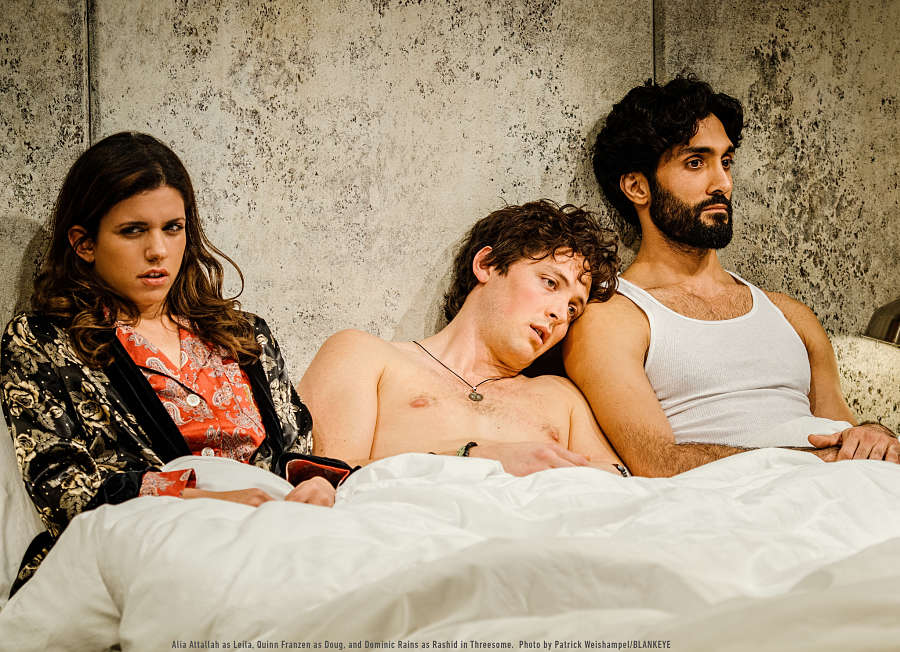SEATTLE: A sexual threesome, some political drama and heightened emotions may sound like a recipe for disaster. But with the right comedic flair, everything can work out just fine, as Yussef El Guindi discovers in his new play Threesome, running at A Contemporary Theatre June 5–28, in a world-premiere coproduction with Portland Center Stage, where it ran earlier this year.
“I never set out to write a comedy, strange as that sounds, given the very broad comedy that takes place in Act One,” El Guindi wrote in an email exchange. “While it’s not hard for me to see the funny in most human situations or interactions, I think it’s tough to set out to be funny. Humor for me naturally arises from awkward situations, and there is no greater source for humor than our own bodies and their messy needs.”
Threesome—which is slated to run at New York City’s 59E59 Theaters July 14–Aug. 23—follows an Egyptian-American couple, Leila and Rashid, who invite a complete stranger, Doug, into their bedroom to “prove a point.” From that initial encounter, a dialogue of political and social opinions unfolds. The themes that El Guindi explores are heavy—ranging from women’s rights in the Middle East, sexual assault and depression—but they’re handled with a light touch. For El Guindi, navigating these thematic waters can be difficult, as these topics are usually only talked about in strident ways.
“In writing a lot of my plays, I do have to be strategic in how to dramatize certain subjects to avoid having the labels ‘political’ or ‘didactic’ slapped onto them,” he explained. “From my perspective, given what I want to write about, it’s hard to divorce domestic, personal matters from political issues. It’s all of one piece, I think; it’s a privilege for most people living in the West to be able to ignore the politics going on around them.”
The subjects of sexuality, and Western perceptions of Muslims’ sexuality, in Threesome are indeed complicated. That’s no surprise, given the fraught relationship of Western powers with the Middle East. Those conflicts feels particularly potent for El Guindi, who was born in Egypt and raised in London.
“The focused and often negative coverage of Arabs and Muslims in the Western media over the past couple of decades plus has greatly preoccupied me, creatively speaking,” said El Guindi. “This false dichotomy seeps into me and creates a weird, self-imposed strangeness between these different halves or thirds—Arab, Muslim, Western—where not only am I required to ‘explain’ things to Westerners, of which I am one. But, worst of all, it creates embarrassment and even shame within me for inhabiting identities that are supposed to be in conflict with ‘Western values.'”
Less-than-sympathetic portrayals of Arabs and Muslims in Western media haven’t helped El Guindi’s case, either. The playwright said that since moving to London at a young age, he has been constantly told his differing backgrounds are incompatible. He describes the resulting shame and embarrassment vividly: First it becomes an irritant, he said, then a wound; then it just festers.
“I find myself gripping the seat and slightly tense whenever there are depictions of Arabs and Muslims onstage or film, because simple conditioning has taught me that 9 times out of 10 those depictions will be nasty, patronizing or just plain wrong,” El Guindi said.
By casting a comic light on Threesome‘s heavy topics, El Guindi hopes to correct the impression that all topics related to the Middle East, or to the Muslim religion, are deadly serious. He hasn’t had universal praise for this approach, though.
“There’s some pushback by Arabs and Muslims to some of my representations onstage,” El Guindi conceded. “When there are more and varied depictions of Arabs and Muslims in the mainstream media, then no one writer will have to carry the weight of having to represent a much maligned group of people.”
Representation and identification, after all, are just synonyms for expression and empathy.
“If I’ve done my job right, the characters’ lives will matter as much to audiences as they have to me,” said El Guindi. “Simple empathy, whether through humor, or observing two people trying to emotionally grapple with a terrible wound, becomes the most important bridge of all.”


